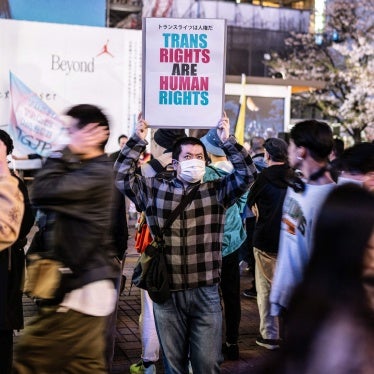(New York) – South Korea should immediately halt the roll-out of its new sex education policy, released early this year, and revise materials that fail to include homosexuality or sexual minorities, Human Rights Watch said in a letter to the government today. The exclusion of lesbian, gay, bisexual, and transgender (LGBT)people from the policy will have discriminatory impact and should be reversed.
In early 2015, the Ministry of Education began to hold training sessions for district education officers across the country on new sex education guidelines that exclude any mention of homosexuality or sexual minorities. In a communique issued in March to explain the policy, the ministry put forward the discordant claims that on the one hand, “the subject of homosexuality is being treated from a human rights perspective in the curriculum,” but on the other, mention of homosexuality is excluded from the curriculum because homosexuality is “not a common issue in relation to sexual orientation,” and “school education needs to be carried maintaining value neutrality regarding society, culture and religion.”
“These guidelines enshrine discrimination on the basis of sexual orientation and gender identity,” said Graeme Reid, LGBT rights director at Human Rights Watch. “Excluding homosexuality and LGBT people in the curriculum sends a pejorative, intolerant message to the youth of South Korea and violates basic rights to information, health, and education.”
The guidelines contradict South Korea’s leadership role at the United Nations in recent years, where it has voted for both the 2011and 2014 Human Rights Council resolutions calling for an end to violence and discrimination based on sexual orientation and gender identity.
The right to health requires that individuals have access to accurate information, including information related to sexual and reproductive health. UN treaty bodies have repeatedly highlighted the importance of accurate and inclusive sex education and information as a means of ensuring the right to health because it contributes to a reduction of the rates of maternal mortality, abortion, adolescent pregnancies, and HIV.
HIV infections have increased sharply in South Korea since 2000, and infections are increasing fastest among men in their 20s. The Korea Centers for Disease Control and Prevention in 2011 made it a priority to improve health education targeted at workers, youth, teenagers, young adults, and elderly in order to diminish risky behavior.
Major UN agencies, such as the UN Population Fund (UNFPA), the World Health Organization, and UNESCO all recommend inclusive approaches to sex education – this is significantly different from what South Korea is moving to implement.
South Korea has ratified the Convention on the Rights of the Child, the Convention to Eliminate all forms of Discrimination Against Women, and the International Covenant on Economic, Social and Cultural Rights. The treaty bodies that monitor these three international covenants have all called to uphold the right to accurate information, including about sexual health.
Some religious groups, however, have pressured the government to exclude information about LGBT people from the sex education curriculum. For example, in 2014, the Korean Association of Church Communication, a religious group, issued a statement condemning the contents of the draft sex education policy for teaching students about homosexuality openly and mentioning “diverse sexual orientations” which, the group claimed, may lead young people to “fall into temptation” and a “wrong” sort of sexual culture.
“For South Korea to grapple with its HIV epidemic and maintain its integrity in international human rights forums, the government needs to ensure accurate and inclusive information is delivered to students as a matter of policy,” said Reid. “That includes information about LGBT people. Erasing a population from the curriculum under pressure from religious groups is only going to sanction shame and cause harm.”







